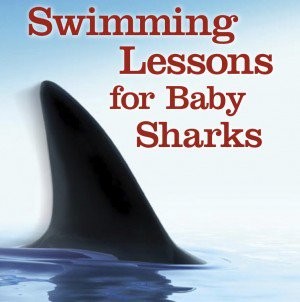Swimming Lessons For Baby Sharks, Practical Advice For New Lawyers
Many law firms devote substantial resources to helping their lawyers improve their writing.

Q: I’m a freshman in High School, and I want to prepare to become an attorney. I have already done a bit of research, but there are still a few questions that I have (below).
A: As I mentioned in part one of my response last month, I am impressed that you are preparing early!

Navigating Financial Success by Avoiding Common Pitfalls and Maximizing Firm Performance
Here are the answers to your remaining questions:
- What are a couple of things I can do to improve my writing skills?
First, you are prescient to ask about writing skills. For most lawyers, writing is an essential skill for success. Many law firms devote substantial resources to helping their lawyers improve their writing. You asked for a “couple” of things, but I am interpreting that loosely: 1) Read The Elements of Style by William Stunk and E.B. White and Point Made: How to Write Like the Nation’s Top Advocates by Ross Guberman; 2) Use apps such as Hemingway for suggestions on grammar and style; 3) Take prose classes in high school and college; and 4) In law school, give writing classes your full attention. It can be easy to give priority to substantive classes such as contracts, because most of the concepts are new. But clear, concise writing is critical for communicating with clients, persuading judges, and drafting solid contracts.
- What does an attorney do on a day-to-day basis?
Sponsored

Is The Future Of Law Distributed? Lessons From The Tech Adoption Curve

The Business Case For AI At Your Law Firm


Navigating Financial Success by Avoiding Common Pitfalls and Maximizing Firm Performance

Is The Future Of Law Distributed? Lessons From The Tech Adoption Curve
This is tough to answer with precision, because there are so many aspects to practicing law. An attorney’s daily endeavors vary depending on the area of law and the attorney’s level of practice. Some of the major categories include: criminal prosecutors and defense attorneys, civil litigators, and corporate attorneys, who generally work on transactions such as contracts. There are many books on legal careers that can help you sort out who does what in practicing law.
- What field should I go into if I do end up becoming an attorney?
Try to pick an area that interests you. If you love your work, you will do better work – and you will be happier. But don’t be too quick to pass over areas of the law that don’t seem enthralling. As you learn more about a particular discipline, you may discover that it’s more interesting than you expected. And some people like the variety of a general practice. Another consideration is demand. It goes without saying that it’s easier to get a job in a growing field than a shrinking one. Your career services office in law school can help you navigate these decisions.
- What should I do in High School to prepare for law school, the LSAT, and the bar?
Keep your grades up. And if you can afford it, I recommend taking an LSAT preparation course and definitely a bar exam preparation course. There is an art to test-taking that can be difficult to learn on your own.
Sponsored

Generative AI In Legal Work — What’s Fact And What’s Fiction?


Legal AI: 3 Steps Law Firms Should Take Now
- What should I consider when determining where I want to work? And should I go to a law school in the state that I want to practice law?
The economy of an area will impact your opportunities. Silicon Valley, for example, is chock full of technology lawyers. And New York City is the nation’s hub of finance work. Areas with lots of retirees generally have more work in trusts and estates. You get the point. And you should also consider the attributes of an area that you will enjoy: Are you near the ocean, in a small town, near your family – or far away from your family? Those are also important considerations. I do recommend going to law school in the state in which you want to practice. The primary benefit is that during law school you can make connections that will make it easier to land a job. Finally, if you want to work at a large firm, I usually recommend going to the highest-ranked law school that accepts you. Choosing schools can pose a conundrum, because lower-ranked schools may offer scholarships. Law school debt is a real issue, but a higher-ranked school can give you more options.
But with all your planning ahead, you will be a rock star!
Oh – and one more thing: You might want to read Swimming Lessons for Baby Sharks.
Good luck!
Join the conversation by submitting questions on Twitter @Babysharklaw or here. Get the new Second Edition of Swimming Lessons for Baby Sharks here.
Grover E. Cleveland is a Seattle lawyer, speaker and author of Swimming Lessons for Baby Sharks: The Essential Guide to Thriving as a New Lawyer (West 2d. 2016). Grover specializes in programs to help new lawyers successfully transition from law school to practice, helping them provide more value and avoid common mistakes. He is a former partner at Foster Pepper PLLC, one of the Northwest’s larger firms. His clients included the Seattle Seahawks and other entities owned by Microsoft co-founder, Paul Allen. Grover is a frequent presenter on lawyer career success and generational issues at leading law firms and schools nationwide. Many questions in this column come from those programs. Readers may submit questions here or follow him on Twitter @Babysharklaw. He is not related to the 22nd and 24th President of the United States.







